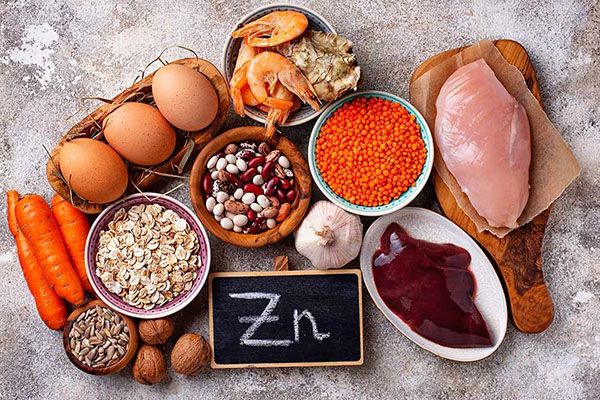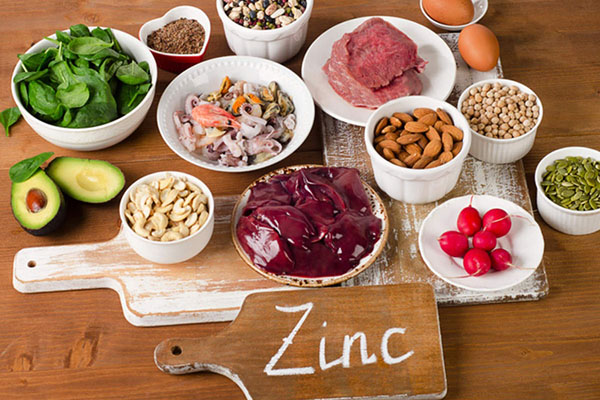Many individuals are curious about the factors that can influence their height and wonder if there is a way to increase their stature. One popular question that arises is whether zinc, a vital mineral known for its numerous health benefits, can contribute to height growth. In this article, we will explore the relationship between zinc and height, examining the scientific evidence to determine if there is a link. So, let’s dive in and uncover the truth about whether zinc can make you grow taller.
What is Zinc?
Zinc is a chemical element with the symbol Zn and atomic number 30. It is a bluish-white metal that is commonly used in various industries due to its versatile properties. Zinc is primarily known for its corrosion resistance, making it a popular choice for galvanizing steel to prevent rust. It is also used in the production of alloys, such as brass, and as a component in batteries.
In addition to its industrial applications, zinc is an essential mineral for human health. It is required for the proper functioning of enzymes and plays a vital role in numerous physiological processes. Zinc is involved in immune function, DNA synthesis, cell division, and wound healing. It is also important for normal growth and development, especially during childhood and adolescence.
Zinc can be obtained through the diet by consuming foods rich in this mineral. Good dietary sources of zinc include seafood, meat, poultry, dairy products, legumes, nuts, and whole grains. However, certain factors such as a vegetarian or vegan diet, gastrointestinal disorders, or certain medications can increase the risk of zinc deficiency.
Symptoms of zinc deficiency may include delayed growth and development, decreased immune function, hair loss, skin problems, and impaired wound healing. In such cases, zinc supplements may be recommended under the guidance of a healthcare professional to correct the deficiency.

How Zinc Impacts Growth?
Zinc plays a significant role in growth and development, particularly during childhood and adolescence. Its impact on growth can be attributed to several key mechanisms and functions within the body.
- Stimulates Growth Hormone Production: Zinc is involved in the production of growth hormones, such as insulin-like growth factor 1 (IGF-1). These hormones play a crucial role in bone growth and maturation, influencing overall height development.
- Promotes Protein Synthesis: Protein synthesis is essential for the formation of new tissues and the repair of damaged ones. Zinc is involved in the synthesis of proteins, including those required for growth and development. Adequate zinc levels support optimal protein synthesis, which contributes to the growth of muscles, bones, and other body tissues.
- Supports DNA Synthesis: DNA synthesis is necessary for cell division, tissue growth, and repair. Zinc is a cofactor for various enzymes involved in DNA synthesis. By supporting this process, zinc ensures proper cell division and replication, which are vital for growth.
- Enhances Immune Function: A strong immune system is crucial for overall health and growth. Zinc plays a role in maintaining immune function, which protects the body from infections and illnesses that can hinder growth. By supporting the immune system, zinc indirectly promotes healthy growth.
- Assists in Nutrient Absorption: Zinc is involved in the absorption and transportation of various nutrients, including vitamins and minerals essential for growth. It helps the body absorb nutrients from the diet, ensuring they are available for growth processes.
While zinc is involved in these growth-related mechanisms, it is important to note that it is not the sole determinant of height. Genetic factors, nutrition, hormones, and overall health also play significant roles in growth and development. However, inadequate zinc levels can potentially impact growth and development negatively.
To ensure optimal growth, it is crucial to maintain adequate zinc intake through a balanced diet. Foods rich in zinc include seafood, meat, poultry, dairy products, legumes, nuts, and whole grains. In some cases, when individuals are unable to meet their zinc requirements through diet alone, zinc supplements may be recommended under the guidance of a healthcare professional.
It’s important to remember that zinc should be consumed in appropriate amounts, as excessive intake can have adverse effects. As with any dietary consideration, it’s best to consult with a healthcare professional for personalized advice on meeting zinc requirements for healthy growth and development.
Impact of Zinc Deficiency on Growth
Zinc deficiency can have a significant impact on growth, particularly during childhood and adolescence. The body requires zinc for proper growth and development, and inadequate levels of this essential mineral can hinder the normal growth process. Let’s explore the effects of zinc deficiency on growth.
During periods of rapid growth, such as childhood and adolescence, the body’s demand for nutrients increases. Zinc plays a crucial role in supporting growth by promoting the production of growth hormones and aiding in the synthesis of DNA and proteins, which are essential for tissue growth and repair. When zinc levels are insufficient, these processes can be disrupted, leading to stunted growth.
One of the primary ways zinc deficiency affects growth is through its impact on the production and activity of insulin-like growth factor 1 (IGF-1). IGF-1 is a hormone that regulates bone growth and plays a pivotal role in determining height. Zinc is required for the synthesis and secretion of IGF-1, and without adequate zinc, the body may struggle to produce sufficient levels of this hormone. Consequently, bone growth and elongation may be compromised, resulting in reduced height potential.
In addition to its role in IGF-1 production, zinc is also involved in the formation and mineralization of bones. Insufficient zinc levels can weaken bones, making them more prone to fractures and impairing their ability to grow properly. This can further contribute to stunted growth and height limitations.
Moreover, zinc deficiency can negatively impact the overall nutritional status of an individual. This can lead to compromised immune function and increased susceptibility to infections and illnesses. When the body is fighting off infections, resources that could have been allocated to growth processes are diverted, further impeding growth and development.
It’s important to note that the effects of zinc deficiency on growth can vary depending on the severity and duration of the deficiency, as well as individual factors such as genetics and overall health. The earlier zinc deficiency occurs, the more pronounced its impact on growth may be. Adequate zinc intake during critical growth periods is crucial to ensure optimal growth and development.
To prevent zinc deficiency and support healthy growth, it’s essential to include zinc-rich foods in the diet. Some examples of zinc-rich foods include seafood (such as oysters and crab), red meat, poultry, beans, nuts, whole grains, and dairy products. A balanced and varied diet that incorporates these foods can help meet the body’s zinc requirements and promote optimal growth.
What is the best way to maintain a balanced zinc intake to support optimal growth?
To maintain a balanced zinc intake and support optimal growth, consider incorporating the following strategies:
- Consume zinc-rich foods: Include foods that are naturally high in zinc in your diet. Good sources of zinc include seafood (such as oysters, crab, and lobster), red meat (beef and lamb), poultry (chicken and turkey), legumes (chickpeas, lentils, and beans), nuts and seeds (pumpkin seeds and cashews), whole grains (oats and quinoa), and dairy products (milk and cheese).
- Prioritize variety: To ensure you receive an adequate range of nutrients, including zinc, focus on consuming a diverse range of foods from different food groups. This will help you obtain a balanced intake of all essential nutrients for optimal growth.
- Consider fortified foods: Some food products, such as breakfast cereals, may be fortified with additional nutrients, including zinc. Check product labels to identify fortified options and incorporate them into your diet as appropriate.
- Be mindful of cooking methods: Certain cooking techniques, such as boiling or overcooking, can cause the loss of zinc from foods. To preserve the zinc content, opt for cooking methods like steaming, baking, or grilling.
- Balance zinc with other nutrients: Zinc works in synergy with other vitamins and minerals for optimal growth. Ensure you maintain a balanced diet that includes a variety of nutrients, such as iron, vitamin C, vitamin D, and magnesium. This will help support the body’s overall growth and development.
- Consider supplementation if necessary: If you are unable to meet your zinc requirements through diet alone or have specific dietary restrictions, consult with a healthcare professional or registered dietitian. They can assess your individual needs and recommend appropriate zinc supplements if necessary.
- Practice moderation: While zinc is essential for growth, it’s important not to exceed recommended daily intakes. Too much zinc can interfere with the absorption of other minerals and lead to adverse health effects. Follow recommended guidelines and consult a healthcare professional if you have any concerns.

Food Sources Rich in Zinc
Here are some food sources that are rich in zinc:
Shellfish: Oysters, crab, and shrimp are excellent sources of zinc. Oysters, in particular, are known to have high levels of zinc.
Meat: Beef, lamb, and pork are good sources of zinc. Lean cuts of meat are recommended for a healthier option.
Poultry: Chicken and turkey are also good sources of zinc. Opt for skinless cuts for a lower fat content.
Legumes: Legumes like chickpeas, lentils, and beans (such as black beans, kidney beans, and white beans) contain zinc. They are also high in fiber and other nutrients.
Nuts and seeds: Pumpkin seeds, sesame seeds, hemp seeds, and cashews are rich in zinc. Other nuts like almonds and peanuts also contain moderate amounts of zinc.
Whole grains: Whole grains like wheat, quinoa, and oats provide zinc along with other important nutrients. Look for whole grain products like bread, pasta, and cereals.
Dairy products: Some dairy products like cheese and yogurt contain zinc. However, it is important to choose low-fat options to avoid excessive saturated fats.
Eggs: Eggs are a good source of zinc, especially the yolk. They also provide various other nutrients.
Dark chocolate: Good quality dark chocolate with a high cocoa content is not only delicious but also contains some zinc.
Vegetables: Some vegetables like spinach, kale, asparagus, and mushrooms contain zinc. While the amounts may be relatively lower compared to other sources, they still contribute to overall zinc intake.
Are there any side effects of taking zinc supplements?
When taken within recommended doses, zinc supplements are generally safe for most individuals. However, excessive intake of zinc can lead to adverse effects. Some possible side effects of taking high doses of zinc supplements include:
Gastrointestinal issues: Taking too much zinc can cause nausea, vomiting, diarrhea, and stomach cramps. These symptoms are more likely to occur when zinc is taken on an empty stomach.
Copper deficiency: Zinc and copper compete for absorption in the body. Prolonged high-dose zinc supplementation can disrupt the balance between these two minerals and lead to copper deficiency. Copper deficiency can cause anemia, neurological problems, and impaired immune function.
Reduced immune function: While zinc is known to support immune function, excessive intake can have the opposite effect. Taking very high doses of zinc for an extended period may weaken the immune system and make it less effective in fighting off infections.
Metallic taste and smell: Some people may experience a metallic taste in their mouth or notice a metallic odor in their breath when taking zinc supplements. This is usually temporary and harmless.
Conclusion
In conclusion, while zinc is essential for overall growth and development, it alone cannot make you grow taller once your growth plates have closed. However, maintaining adequate levels of zinc through a balanced diet and correcting zinc deficiencies can help individuals achieve their maximum height potential. Remember that height is influenced by multiple factors, including genetics, hormones, and overall health. Consult with healthcare professionals for personalized advice on promoting healthy growth.
- Related post: Can Pull-Ups Increase Height?

Erik Kelly with more than 30 years of working in the field of technology and games. Erik Kelly will answer all your questions related to the latest technology products, new game reviews at Timrim.com website.